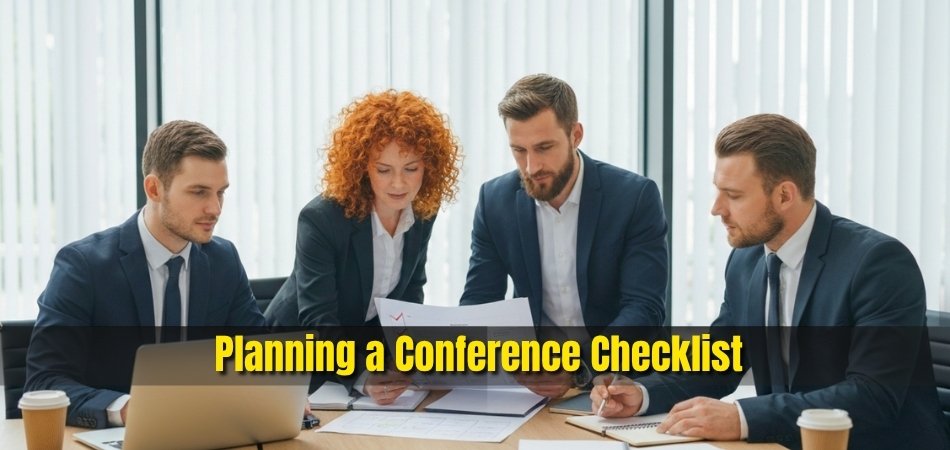Organizing a conference takes patience, planning, and good teamwork. It brings many tasks together, from setting goals to choosing speakers and handling guests. Each step matters to make the event run smoothly and stay on track. You might be thinking about where to start, and that’s where planning a conference checklist can help.
A planning checklist for a conference helps you stay organized from start to end. It includes setting goals, choosing a venue, creating a budget, inviting guests, arranging food, handling tech needs, and promoting the event. It also covers follow-up steps like sending thanks and collecting feedback. This makes sure nothing gets missed and everything runs smoothly.
Would you like to know what steps make a conference successful? Keep reading because this article shares every simple and helpful detail you need to plan a perfect event from start to finish.
Planning a Conference Checklist
Planning a conference takes time, care, and clear organization. Each step matters to make the event smooth and successful. You need to think about goals, budget, people, and tools. Let’s go through a simple checklist that helps you plan every detail with ease.

Set Clear Goals
Before you start, know what the conference is about. Decide why you are hosting it and what you want to achieve. Clear goals help guide all other plans. Whether it’s learning, networking, or sharing ideas, your goals shape every part of the event.
Choose the Right Date and Venue
Pick a date that gives you enough time to prepare. Check for holidays or other big events that might clash. The venue should fit your guest count, have good transport access, and offer basic needs like chairs, restrooms, and parking. Visit before booking to avoid surprises.
Plan Your Budget
Start by listing everything you’ll spend money on. This includes venue rent, food, speakers, and decorations. Add a small extra amount for last-minute costs. Keep checking your budget as you plan so you don’t overspend. A simple spreadsheet can help you track it all easily.
Invite Speakers and Guests
Find speakers who match your conference theme. Send invites early and confirm their topics and needs. For guests, share event details clearly through email or social media. Add easy registration links to make signing up simple and quick. Early invites give everyone more time to plan.
Arrange Food and Equipment
Plan for meals, snacks, and drinks during breaks. Ask the venue if they offer catering or if you need to hire one. Check that microphones, screens, and projectors work well. Always have backup options ready. Small things like extra batteries or cables can save your day.
Promote Your Conference
Spread the word using simple tools like social media and email. Create short posts that tell what your event is about and why people should join. For example, if you are planning conferences in USA, highlight the city and theme to attract the right crowd. Keep sharing updates to build excitement before the big day.
Prepare On-site and Online Help
Make sure you have a team ready to guide guests on-site. For online events, test your video and audio setup early. Share links and instructions before the event starts. Have one person handle questions and tech issues so everything runs smoothly for everyone involved.
Review And Follow Up
After the event, take time to check what went well and what didn’t. Ask for feedback through short surveys. Thank your speakers and guests for joining. Keep in contact with attendees for future events. Each review helps you make your next conference even better and smoother.
Why Having a Checklist Matters for Conference Success?
A checklist makes planning smoother and less stressful. It keeps you focused on what needs to be done and helps you avoid a last-minute rush. With so many moving parts in a conference, having a clear plan saves time, reduces confusion, and ensures that nothing important is missed. Let’s look at a few strong reasons why using one can make your event planning much easier and more successful.
Keeps Everything Organized
When planning a big event, it’s easy to lose track of small tasks. A checklist keeps everything in one place so nothing slips through. You can track what’s done and what’s pending. This gives peace of mind and helps your team work in a clear and steady way from start to finish.
Reduces Stress and Saves Time
Without a checklist, people often waste time remembering what to do next. Writing tasks down helps you focus better and move faster. You can see progress, make updates, and spot delays early. It saves hours of guessing and reduces the pressure that often comes with last-minute planning problems.
Improves Team Coordination
A conference involves many people working together. A checklist helps everyone see the full plan. It avoids confusion about who is handling what. A clear checklist not only keeps things organized but also raises team motivation during event planning, as everyone knows what needs to be done and when.
Helps Manage Budget and Resources
Having all tasks listed makes it easier to match actions with the budget. You can see where most money is going and plan smartly. This avoids sudden spending and helps you stay within your set amount. It also helps manage resources like staff, equipment, and supplies effectively.
Ensures Better Event Flow
When every step is written down, it’s easier to follow the timeline. A checklist makes sure all parts of the event happen in the right order. From setup to clean-up, everything stays on track. This helps your event flow smoothly without gaps or unexpected delays that can stress the team.
Encourages Accountability
With a checklist, each team member knows their assigned tasks. It’s easier to follow up and see who needs help. This builds a sense of responsibility and teamwork. Everyone feels more involved and confident knowing what’s expected. It also keeps the event running on time with fewer mix-ups.
Typical Mistakes to Avoid When Planning a Conference
Conference planning is an exciting process, but it can quickly go wrong. Many organizers skip small details that later cause big problems. Knowing what to avoid helps save time and money. Let’s go through the common mistakes and how to prevent them for a smooth and successful event.
Ignoring Early Planning
Starting too late can create chaos and stress. Many tasks take longer than expected, such as booking venues, inviting speakers, or setting up catering. Begin early so you have time to fix issues calmly. A clear plan gives you enough space to handle every part without rushing or missing details.
Poor Budget Management
Not setting a clear budget often leads to extra costs. Always note every expense, even small ones, and track them closely. Keep a small backup fund for sudden needs. You can use a free online template to manage costs easily and stay within your spending limits.
Weak Team Communication
When your team is not aligned, tasks overlap or get missed. Regular meetings keep everyone informed and focused. Simple tools like shared checklists help track updates. Clear communication builds teamwork and keeps all members on the same page. Good coordination is key to running any event successfully.
Skipping Promotion Efforts
Even a well-planned event can fail without good promotion. Many planners forget to promote early or often enough. Use social media, email, and websites to share details. Add visuals and short posts to catch attention. Keep updates frequent so more people know about your conference.
Overlooking Guest Comfort
Guests remember how they felt during an event. Ignoring comfort can leave a poor impression. Make sure seats, restrooms, food, and space are all ready. Think about small details like signs and water stations. Good planning makes guests feel cared for and happy to attend again.
No Backup Plans
Things can go wrong no matter how well you plan. Power cuts, tech issues, or late speakers can cause trouble. Always have a plan B for each major part. Prepare backups for audio, lighting, and schedules. Being ready helps you stay calm and handle surprises smoothly.
Forgetting Post-event Review
Many planners move on after the event without checking what worked or failed. Always review feedback, survey answers, and team notes. This helps improve your next event. A simple meeting after the conference can point out strong and weak areas for future planning success.
What Are Some Ways to Draw Speakers and Participants to a Conference?
Getting people to join your conference takes smart and simple planning. You need to give them clear reasons to attend and take part. When both speakers and guests see real value, they become more interested. Let’s go through some easy ways below to make your event stand out.
Offer a Clear Purpose
People join when they know the goal is worth their time. Explain what the event is about in simple words. Focus on what they will learn or gain. Clear goals help speakers shape their talks and help guests decide to register early. A strong purpose attracts attention fast.
Invite Known Speakers
A few well-known names can bring big interest. Popular speakers add trust and pull more people to attend. Reach out early to secure them before others do. Add their names to your event posters and social posts. Having them on your list helps boost event sign-ups quickly.
Use Social Media
Social media is a free and strong tool for promotion. Share short posts about topics, guests, and updates often. Add photos and short clips to make it more lively. Create a hashtag for your event and ask others to share it. This keeps your event active online and easy to find.
Give Early Bird Discounts
Discounts are a simple way to grab attention fast. Offer lower prices for those who register early. It creates a sense of urgency and rewards early planners. You can also give small perks like free lunch coupons or reserved seats. These small touches make your event more inviting.
Create Networking Chances
People love to meet others with shared goals. Add breaks and fun sessions where guests can talk freely. Speakers enjoy events that help them connect as well. Simple things like coffee chats or group games build friendly vibes. Networking helps everyone feel involved and happy to join again.
Share Useful Event Details
Make all event information clear and easy to reach. Share venue maps, schedules, and contact info early. Update your website and emails often to avoid confusion. When people find things easily, they trust your event more. A smooth sign-up and info process makes joining much simpler.
Show Past Event Success
Sharing photos, videos, or short reviews from past events builds trust. It shows what new guests can expect and makes them excited. Add these stories to your website or event page. People love to see real results and happy faces before they decide to attend.
Post-Conference Tasks Organizer Shouldn’t Skip
Your event might be over, but your work isn’t done yet. What happens after a conference is just as important as the main day. Wrapping things up well helps you plan better next time. Let’s break down the post-conference tasks you really shouldn’t miss out on:
Send Thank-you Emails
A simple thank-you goes a long way. Send emails to attendees, speakers, and sponsors to show appreciation. Include short notes about event highlights and future plans. This builds good relationships and leaves a positive final impression. Grateful communication encourages people to attend your next event too.
Collect Feedback
Hearing what others think helps you improve. Create short surveys for guests and speakers to share honest feedback. Ask what they liked and what could be better next time. Gather their ideas to shape future events. It’s a simple step that shows you care about their experience.
Review Goals and Results
After the event, check if your goals were met. See how well you managed attendance, engagement, and timing. It’s also good to review the duration of conference planning process to see if your timeline was realistic or if future events need more preparation time. This reflection builds stronger planning habits.
Share Event Highlights
Keep the energy alive by sharing photos, clips, and key takeaways. Post them on your website and social media pages. People enjoy reliving the moments and sharing their experiences online. These highlights also help new people learn about your event and join next time.
Meet With Your Team
Hold a short team meeting after the event. Talk about what went smoothly and where things got hard. Praise the team for their hard work. Honest talks help everyone learn together and plan better for the next event. It builds teamwork and keeps motivation high for future projects.
Frequently Asked Questions
Setting dates and sending out invitations is only the beginning of conference planning. Many small details shape how well your event turns out. Below are some common questions and clear answers to help you plan better, save time, and keep your conference smooth from start to finish.
How Far in Advance Should You Start Planning a Conference?
The best time to start planning is at least six months before the event. This gives you enough time to book venues, invite speakers, and confirm sponsors. Early planning helps you avoid rushed decisions and keeps things organized. It also allows room to handle last-minute changes smoothly without stress or panic.
What Tools Can Help in Managing a Conference Checklist?
Simple online tools like Google Sheets, Trello, or Asana can help manage tasks. They let your team share updates, track deadlines, and assign jobs easily. You can set reminders and mark progress as you go. These tools keep everyone connected and make teamwork more effective during event planning.
How Do You Keep Track of Guest Registrations?
The easiest way is by using online registration platforms. Websites like Eventbrite or Google Forms allow guests to register and get confirmation automatically. You can collect contact details, meal preferences, and payment info in one place. Keeping everything digital makes it faster and more organized for both guests and the planning team.
Why Is Team Coordination Important in Conference Planning
Team coordination keeps every part of the plan running smoothly. It helps divide work, avoid confusion, and make sure no task is missed. Regular updates and clear roles keep everyone focused. A well-coordinated team is key to handling large events with ease.
How Can You Handle Last-minute Cancellations?
Always have a clear cancellation policy ready before the event. Keep a waiting list in case someone drops out. Stay calm and flexible with changes. If speakers or vendors cancel, quickly reach out to backups. Having extra names or contacts listed in your checklist helps fix such issues fast.
Why Is It Important to Review Feedback After a Conference?
Feedback gives you honest insight into what worked well and what didn’t. It helps you spot weak points and improve future events. Collecting feedback also shows guests and speakers that their opinions matter. This simple step builds trust and keeps people interested in attending your next conference.
How Do You Choose the Best Venue for a Conference
Pick a place that’s easy to reach and fits your guest count. Check for parking, restrooms, and tech support. Visit in person before booking. Make sure the space matches your event’s mood and needs. The right venue adds comfort and confidence for guests.
Final Thoughts
A great event doesn’t end when the lights go out or the guests leave. The real success comes from how well everything was planned, managed, and wrapped up. A good system keeps every task clear, every goal on track, and every detail in place.
That’s where planning a conference checklist proves its worth. It turns complex work into simple steps that save time and reduce stress. With this guide, you can set goals, handle budgets, arrange speakers, and manage the event without confusion. It helps you build confidence and stay organized from start to finish.
If you’re ready to make your next event smooth and stress-free, start planning smart. Follow each step with care, involve your team, and enjoy watching your well-planned conference come to life with success.







